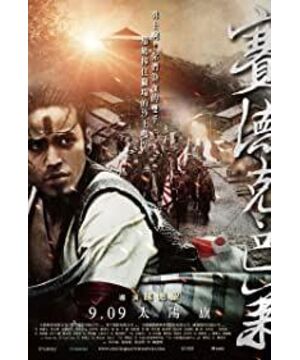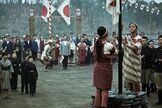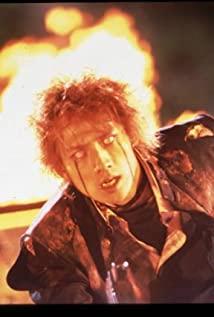In the face of Japan's unfair rule, (Actually, I personally think that Japan's colonial policy towards them in the film is not brutal, winning or losing, the Japanese nation has their pride, and the Japanese who are really responsible for guarding them will have a lot of fun. A sense of superiority to a large extent), prompted by various contradictions, the resistance began. After 20 years of Japanese colonization, the leaders of various tribes have had different considerations, and there are two options: 1. Revolt massively and die with Japan. 2. Hold your breath and save the lives of more clansmen. Mona chose the former.
In the face of choice, the whole history is thinking. 1. Colonization by imperialism is brutal, but from the perspective of the entire historical process, colonization undoubtedly promoted the pace of civilized society. 2. Thinking from a humanitarian point of view, it is the most important thing to save the lives of your own tribesmen, and war will only destroy human society. The film also wanders and thinks about these two points. 1. A Seediq who received Japanese higher education and became a policeman said: "Isn't it bad to be ruled by Japan? Isn't it bad to have a post office and a school?" 2. Facing the lives of the rest of the tribe , a leader said: "In exchange for the mark of the totem, what is the exchange for a young life?" Mona answered them----"Pride". 1. "If your civilization asks me to bow down, then I will show you the pride of barbarism." 2. Seediqs can lose their bodies, but never lose their souls.
At this moment, we should no longer measure this film with civilization, but with humanitarianism. Every life has its own form of value. Living for pride is the life value of Seediq people. As an audience, I just In this moment I saw a life form living for my beliefs. This life form only obeys the call of the soul. They are like wild leopards in the mountains and forests, with cold eyes and bloody bravery. In order to finally walk across the Rainbow Bridge, see the ancestral spirit guarding the hunting ground, and entrust hatred and body among the clouds. Proud and proud, they are winning the pride of their souls. Seediq Bale!
The rainbow geek in my mind, Wei Desheng, relied on "Sedek Bale" after "Cape No. 7" to create an immortal history again in a new Taiwanese film, a heroic hymn. I can personally see the weirdness of Wei Desheng through this film. Whether it is "Cape No. 7" or "Sedek Bale", the rainbow is an important image in the film. The rainbow has become a symbol of beauty. I think Wei Desheng must like the rainbow, and the rainbow must also be the light of hope in his mind. . He pinned his inner hope and beauty in the movie. He went bankrupt while filming "Cape VII," which ended up being a big hit. When filming "Sedek Bale", he borrowed heavily. Because shooting such an epic masterpiece has always been his dream, and he has been preparing for this dream for 12 years. Such a director who has no reservations for film art and is a weird and talented director is officially the type of director I am looking for. Maybe, this way of doing things is always a little bit similar to me. I don’t want to do it once and for all, and I don’t want to get results. I just want to do everything for the dream in my heart and for what I want to do at all costs.
Rainbow genius is also a title that only Wei Desheng deserves in my mind.
In addition, one thing Wei Desheng admires very much is his grasp of the "degree" of the film, which is just right. In "Cape No. 7", the degree of grasping the "emotion" is just right, making the audience cry, but there is no suspicion of sensationalism. In "Sedek Bale", it shows the living conditions and national flavors of the indigenous people. Still just right. After reading it, it gave me a feeling of "comfortable", which made me feel very comfortable. And Wei Desheng himself has a wonderful combination of music and monologue. The music in the two films is very good, and the monologue is like a dulcimer piece, bit by bit.
Having said so much, I seem to have forgotten one thing in the end. Wei Desheng should not have filmed the second episode. The most beautiful form of life has reached its best state in the last episode. The soul has reached this stage and is the most amazing. The state of the set is enough to interpret life and belief, enough to interpret pride and heroism. The existence of the next episode undoubtedly deepens this kind of tragic and solemnity, but it also undoubtedly makes "Sedek Bale" fall into a bloody, brutal and inhuman discussion. The director's filming of the second episode should be based on two considerations. 1. Respect history, truly reflect the epic, and reflect the Wushe incident in Taiwan's history. 2. Don't let yourself go completely bankrupt. "Cape No. 7" had a box office of 500 million that year, which is already the ultimate saturation of the Taiwan market, while "Sedek Bale" invested NT$700 million, in order to recover the cost as much as possible, the film is divided into two levels The release is undoubtedly a very funny approach.
View more about Sai de ke · ba lai: Tai yang qi reviews











